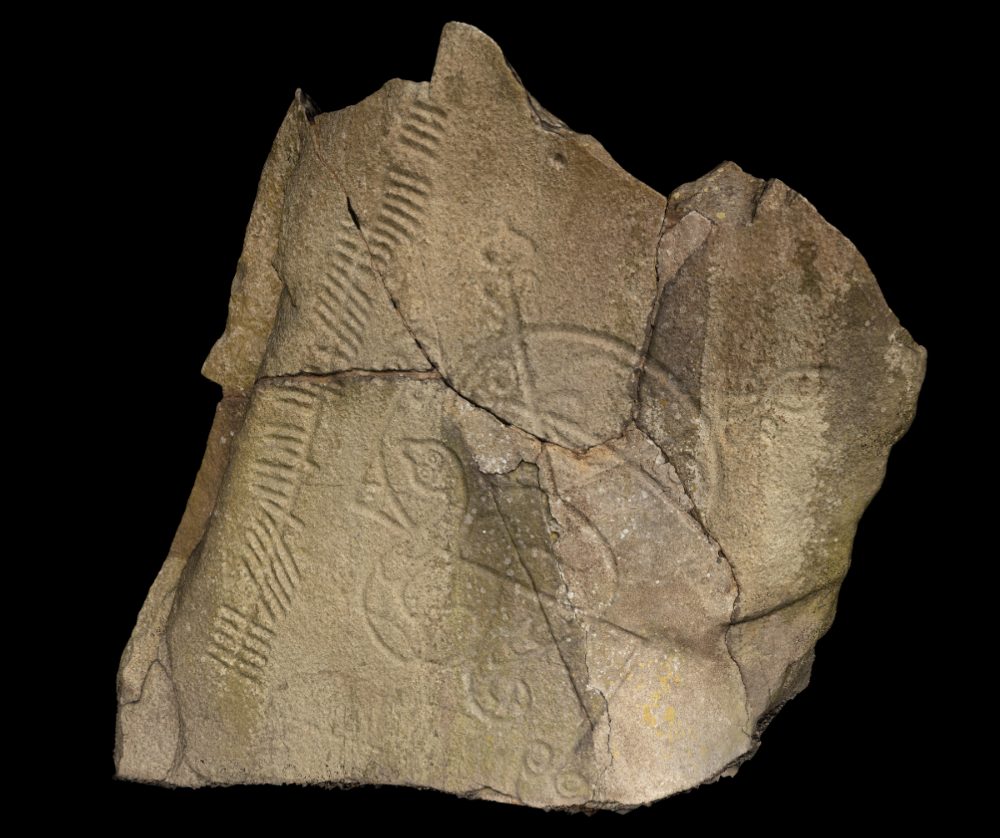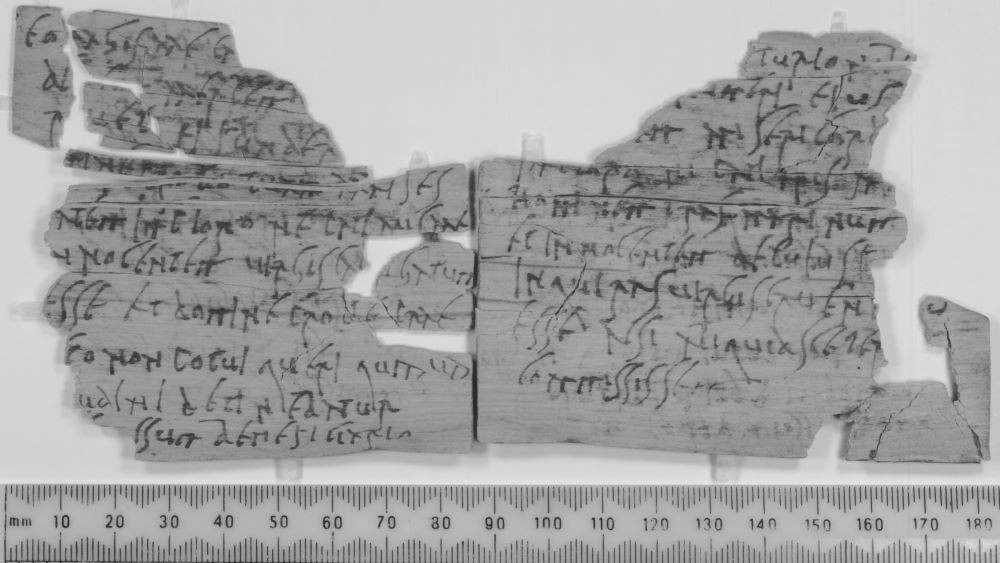Wednesday, 26 November 2025
What did the voices of Britain sound like during and after the Roman period? How did early British communities construct and represent their identities, and how did they interact with their neighbours overseas? An innovative University of Nottingham research project – which aims to uncover the diverse voices, identities, and cultural interactions that shaped early British history – has been awarded UK Research and Innovation (UKRI)-funding, to answer these questions.
Alex Mullen, Professor of Ancient History and Sociolinguistics, in the Department of Classics and Archaeology, has been awarded £1.4m to lead the ambitious four-year project Voices of Britain Under and After Rome, with colleagues and partners at the University of Glasgow, the British Museum, the Roman Baths Museum, the Classical Association, and the charity Classics for All.

The sixth-century AD Brandsbutt bilingual stone (Inverurie, Aberdeenshire), with Pictish symbols on the face and Celtic in Ogham script on the edge (© Ogham in 3D project)
The project, set to begin in October 2026, will analyse the evolution of languages and identities in Britain from the century before Roman rule to the seventh century AD. By integrating sociolinguistics, epigraphy, history, art history, and archaeology, the research will provide a comprehensive understanding of the cultural entanglements that influenced early British communities, emanating from within Britain itself and from Ireland, Scandinavia, and the northern Continent.
The project will leverage cutting-edge technology, including bespoke AI models developed in recent projects, to analyse millions of data points and images from extensive datasets, such as Roman Inscriptions of Britain Online and the LatinNow project. This approach aims to uncover new insights into regional and social patterns, connectivities, and the experiences of communities under and after Roman rule.
We have a unique opportunity in this project to combine innovative methodological approaches and large datasets to transform our understanding of language and culture in early Britain. By reaching across the unhelpful boundaries of disciplines and time periods, the international team will tackle complex questions about the formation and representation of identities, and share the knowledge widely with the public.”
Alex Mullen, Professor of Ancient History and Sociolinguistics, Department of Classics and Archaeology
The key objectives of the project include:
- Producing the first comprehensive sociolinguistic analysis of Roman and early post-Roman Britain, examining linguistic differences across regions, social groups, and genders.
- Exploring the regional, social, and temporal dimensions of inscriptions, symbols, and images in stone to uncover their sociolinguistic messages.
- Investigating the development of writing systems such as Ogham and Pictish symbols during the later Roman period.
- Synthesizing findings to understand the impact of migration, Roman rule, and interactions with neighbouring regions on the identities and cultural heritage of early Britain.
- Collaborating with museums and educators to deliver societal impact through exhibitions, redisplays, teacher training, and school curriculum resources for Scotland, England and Wales.

An ink-written Latin letter sent to Vindolanda fort in the early second century AD by an ‘overseas’ man complaining about being beaten up, presumably by soldiers (© The Centre for the Study of Ancient Documents/The Trustees of the British Museum)
Project Co-Lead, Katherine Forsyth, Professor of Celtic Studies at the University of Glasgow, said: “By breaking down the barrier between Roman Studies and Celtic Studies, and taking a long view which outlasts Roman rule in Britain, we are going to ask new questions of the datasets already amassed.
“We are now able to capitalize on what has been achieved in Digital Humanities thus far, I look forward to listening to ‘Voices of Britain’ and what they tells us about emerging identities in a multi-cultural and multi-lingual world.”
Header image: An artist’s recreation of a bustling scene in the temple courtyard of Roman Aquae Sulis, Bath, Somerset. (© Ivan Lapper).
Story credits
More information is available from Professor Alex Mullen in the Department of Classics and Archaeology, via alex.mullen@nottingham.ac.uk
Notes to editors:
About the University of Nottingham
Ranked 97 in the world and 17th in the UK by the QS World University Rankings, the University of Nottingham is a founding member of Russell Group of research-intensive universities. Studying at the University of Nottingham is a life-changing experience, and we pride ourselves on unlocking the potential of our students. We have a pioneering spirit, expressed in the vision of our founder Sir Jesse Boot, which has seen us lead the way in establishing campuses in China and Malaysia – part of a globally connected network of education, research and industrial engagement.
Nottingham was crowned Sports University of the Year by The Times and Sunday Times Good University Guide 2024 – the third time it has been given the honour since 2018 – and by the Daily Mail University Guide 2024.
The university is among the best universities in the UK for the strength of our research, positioned seventh for research power in the UK according to REF 2021. The birthplace of discoveries such as MRI and ibuprofen, our innovations transform lives and tackle global problems such as sustainable food supplies, ending modern slavery, developing greener transport, and reducing reliance on fossil fuels.
The university is a major employer and industry partner – locally and globally – and our graduates are the third most targeted by the UK’s top employers, according to The Graduate Market in 2024 report by High Fliers Research.
We lead the Universities for Nottingham initiative, in partnership with Nottingham Trent University, a pioneering collaboration between the city’s two world-class institutions to improve levels of prosperity, opportunity, sustainability, health and wellbeing for residents in the city and region we are proud to call home.